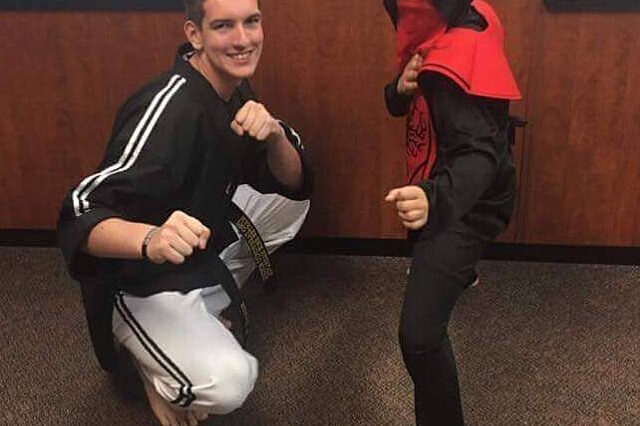Finding the Root of the Problem

Ask Ethan Church what he’s passionate about and the answer may seem unusual for a 17-year-old: forestry and soil science. A first-degree black belt assistant instructor in taekwondo and vice president of the Florida Future Farmers of America chapter in Bronson, Florida, Ethan aspires to pursue a career in forestry and natural resources. Through his experiences in the outdoors, he has always sought to learn more about what shapes the environment. But little did Ethan and his family know that they would have to dig deep to get to the root of a mysterious illness.
On Dec. 9, 1999, Ethan was born without complications to Russell Church and Leigh Ann Holland in Newport News, Virginia. The family moved to Bronson, Florida, where Ethan had an active and healthy childhood. But one day in November 2015, while Ethan was getting ready for school, Leigh Ann noticed blood in the toilet. In a state of near-panic, she made an appointment for Ethan to be seen by his pediatrician. After an evaluation, the family was referred to Genie Beasley, M.D., a gastroenterologist at UF Health Pediatric Specialties at Medical Plaza and co-director for the UF Health Pediatric Inflammatory Bowel Disease Clinic.
Beasley suggested a colonoscopy and endoscopy to better identify Ethan’s condition. Unfortunately, Ethan’s condition became so dire that Beasley decided against performing a colonoscopy, out of concern that she might perforate, or puncture, his colon during the procedure. After additional testing and examination, Ethan was diagnosed with ulcerative colitis, or UC, a chronic, inflammatory bowel condition similar to Crohn’s disease.
Classic symptoms of UC are bloody diarrhea and abdominal cramping, said Beasley. Although UC can strike at any age, it has been on the rise in young adults more so in recent years, leaving doctors puzzled.
Ethan was placed on a medication plan but a rapid onset of UC symptoms landed him at the UF Health Shands E.R. Once Ethan’s flare-up subsided, his family agreed with Beasley’s recommendation to start infusion treatment. Similar to chemotherapy treatment, during infusion therapy a patient is given a biologic medicine intravenously on a regular basis. Every four weeks, Ethan was given REMICADE®, an immunosuppressant that builds up and acts as an anti-inflammatory. His condition slowly began to improve as he had less pain and more of an appetite, along with the ability to keep his food down. For six months, Ethan continued to receive infusion therapy and remained in remission.
Nearly one year after Ethan started experiencing symptoms of UC, his health took a turn for the worse – this time with chest pains. Russell and Leigh Ann rushed Ethan to UF Health where doctors diagnosed him with a Takotsubo cardiomyopathy, a weakening of the left heart ventricle due to stress, and bicuspid aortic valve with dilation of the aorta, a congenital heart defect otherwise known as an enlarged aorta that is on the verge of rupturing. For two weeks, Ethan stayed at the hospital and was put on blood pressure medication to lower his heart rate and decrease the risk of his aortic aneurysm bursting.
Russell and Leigh Ann were determined to find the underlying cause of their son’s mysterious medical condition. With the help of a geneticist, Beasley and Renata Shih, M.D., a pediatric cardiologist at the UF Health Congenital Heart Center, diagnosed Ethan with Loeys-Dietz syndrome, a genetic connective muscle tissue disorder that has only been identified since 2005.
After learning of this disease, Leigh Ann recognized that Ethan had certain physical signs of Loeys-Dietz syndrome all along, including exceptionally long arms, tall height, stretch marks, and a narrow torso that were originally thought to be growing pains. Other symptoms associated with this syndrome include inflammatory bowel disease and cardiac defects.
On Dec. 19, 2016, just past his 17th birthday, Ethan underwent open-heart surgery performed by Mark Bleiweis, M.D., director and chief of congenital cardiothoracic surgery at the UF Health Congenital Heart Center, and his team to repair Ethan’s aortic valve and reinforce the vessel wall.
“We have certain levels that we look at to determine the right time to perform this surgery. The levels help us identify when we’re at risk of the vessel wall rupturing. Unfortunately, if it were to rupture, there’s nothing you can do,” Shih said. “Once his levels reached a certain point, our team of pediatric cardiologists at the UF Health Congenital Heart Center gave full approval to proceed with his operation.”
Along the way before and after Ethan’s surgery, Connie Nixon, R.N., a clinical coordinator at the UF Health Congenital Heart Center, would also play a critical role in helping Ethan understand the intricate steps along the way to recovery.
“They [the team at the UF Health Congenital Heart Center] are constantly making sure my child is taken care of,” Leigh Ann said. “They all know what’s going on and they all call. Connie, especially, texts him to make sure he’s taken care of and will make me bring him in if she thinks it’s necessary.”
Since his surgery, Ethan continues to receive infusion therapy every four weeks and follow-up care by Shih and Beasley. Although there is no cure for Loeys-Dietz syndrome or UC, Ethan has no intention of letting his condition hold him back from accomplishing his life goals. He’s on pace to graduate with a 4.0 GPA, to be salutatorian of the dual-enrollment program he’s in, and to pursue his dream of a career surrounded by life-affirming nature.
About the author
